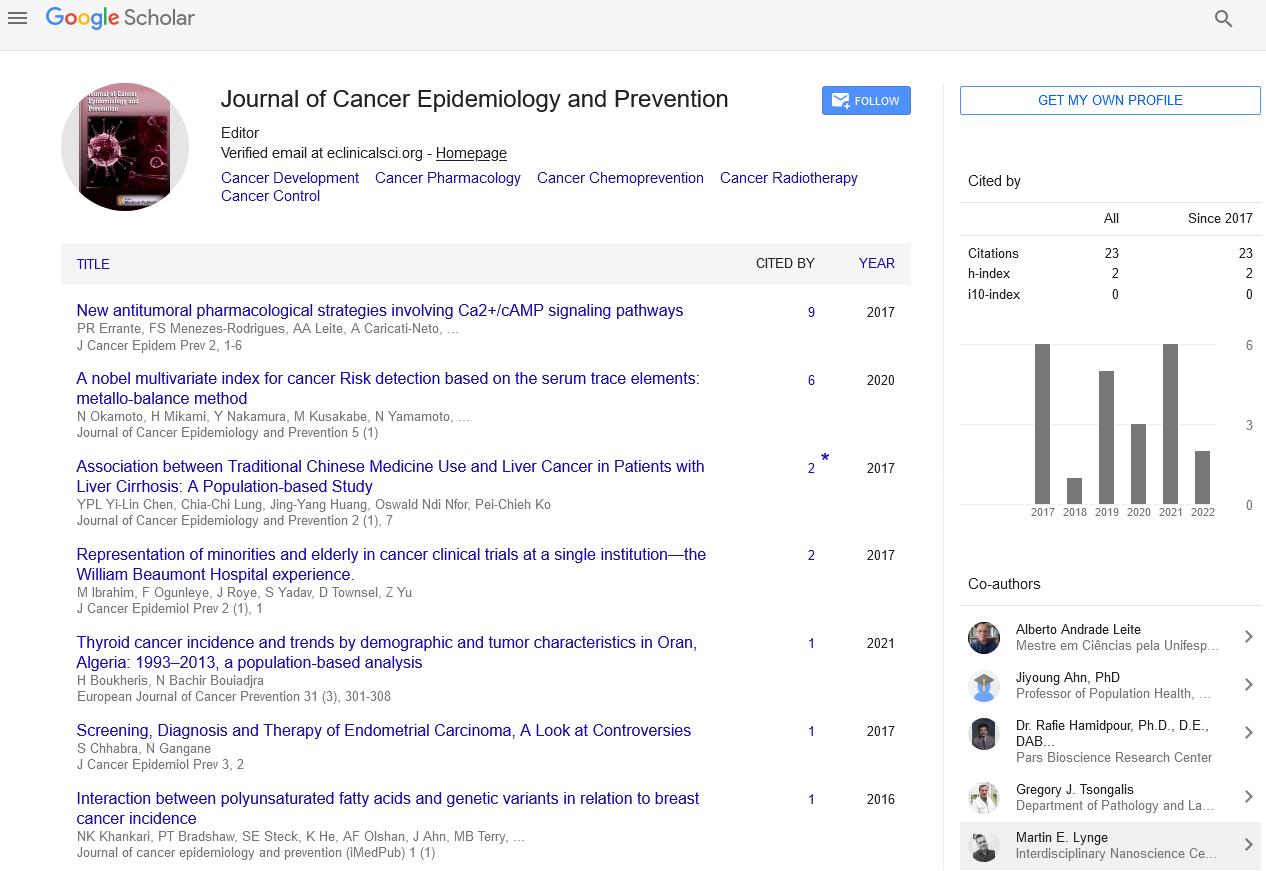Perspective - (2023) Volume 8, Issue 2
Understanding Skin Cancer: Types, Treatment and Prevention
Paolo Gianluca*
Department of Pathophysiology and Transplantation, University of Milan, Milan, Italy
*Correspondence:
Paolo Gianluca, Department of Pathophysiology and Transplantation, University of Milan, Milan,
Italy,
Email:
Received: 23-May-2023, Manuscript No. IPJCEP-23-17697;
Editor assigned: 26-May-2023, Pre QC No. IPJCEP-23-17697 (PQ);
Reviewed: 09-Jun-2023, QC No. IPJCEP-23-17697;
Revised: 01-Sep-2023, Manuscript No. IPJCEP-23-17697 (R);
Published:
29-Sep-2023, DOI: 10.36648/IPJCEP.23.08.013
Introduction
The most prevalent malignant neoplasms in humans are
nonmelanoma skin malignancies including basal cell
carcinomas and squamous cell carcinomas. Despite the fact
that there are numerous environmental and genetic factors
that affect the development of skin malignancies, prolonged
sun exposure is the most significant. We now recognise that
UV has a dual role in the emergence of nonmelanoma skin
malignancies. First, UV radiation alters the DNA of living
things. In the end, uncontrolled growth and tumour formation
result from failure to correct these genetic abnormalities. The
cutaneous immune system is greatly impacted by UV light and
this leads to a condition of relative immunosuppression that
hinders tumour rejection. The goal of this review is to inform
clinical dermatologists about recent advances in molecular
biology and immunology that have significantly improved our
comprehension of the development of skin malignancies. This
new information has broad therapeutic ramifications that will
probably soon affect the identification, management and
prevention of a number of benign and malignant skin
disorders. To successfully use these novel therapeutic
discoveries, the clinician will need to grasp the basic
mechanisms underlying them.
Skin cancer is a common type of cancer that affects millions of
people worldwide. There are several types of skin cancer, but
the most common are basal cell carcinoma, squamous cell
carcinoma and melanoma. Treatment for skin cancer depends
on the type and stage of the cancer, as well as the patient's
overall health.
Description
Surgery
Surgery is the most common treatment for skin cancer. The
surgeon removes the cancerous tissue, along with a margin of
healthy tissue around it, to ensure that all cancer cells are
removed. If the cancer is small, surgery can often be done in a
doctor's office using local anesthesia. However, larger tumors
may require general anesthesia and more extensive surgery.
Radiation Therapy
Radiation therapy uses high-energy radiation to kill cancer
cells. This treatment is often used in conjunction with surgery
or as a standalone treatment for cancers that cannot be
removed surgically. Radiation therapy is usually administered
daily over several weeks.
Chemotherapy
Chemotherapy uses drugs to kill cancer cells. This treatment is
rarely used for skin cancer because most skin cancers do not
respond well to chemotherapy. However, it may be used if the
cancer has spread to other parts of the body.
Immunotherapy
Immunotherapy is a type of treatment that uses the body's
immune system to fight cancer. This treatment is often used
for melanoma and other advanced skin cancers.
Immunotherapy drugs work by blocking the proteins that
allow cancer cells to evade the immune system. This helps the
immune system recognize and attack cancer cells.
Targeted Therapy
Targeted therapy is a type of treatment that targets specific
molecules that contribute to cancer growth. This treatment is
often used for advanced melanoma and other skin cancers.
Targeted therapy drugs work by blocking the activity of
specific proteins that help cancer cells grow and divide.
Photodynamic Therapy
Photodynamic therapy is a type of treatment that uses a
combination of light and drugs to kill cancer cells. This
treatment is often used for non-melanoma skin cancers that
are confined to the surface of the skin. The patient is given a
drug that makes cancer cells sensitive to light. The doctor
then shines a special light on the area, which activates the
drug and kills the cancer cells.
Cryotherapy
Cryotherapy is a treatment that uses extreme cold to destroy
cancer cells. This treatment is often used for small, early-stage skin cancers. The doctor applies liquid nitrogen to the
cancerous tissue, which freezes and destroys it.
Conclusion
Several skin cancer therapies available, ranging from surgery
to radiation therapy, chemotherapy, immunotherapy, targeted
therapy, photodynamic therapy and cryotherapy. The type of
treatment used will depend on the type and stage of the
cancer, as well as the patient's overall health. It is important
to note that early detection is crucial for successful treatment
of skin cancer and regular skin checks with a dermatologist
are recommended for individuals at high risk of developing
skin cancer.
Citation: Gianluca P (2023) Understanding Skin Cancer: Types, Treatment and Prevention. J Cancer Epidemiol Prev. 08:013.
Copyright: © 2023 Gianluca P. This is an open-access article distributed under the terms of the Creative Commons
Attribution License, which permits unrestricted use, distribution, and reproduction in any medium, provided the original
author and source are credited.

